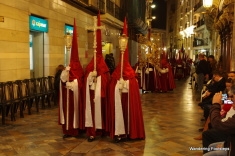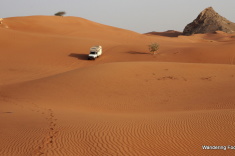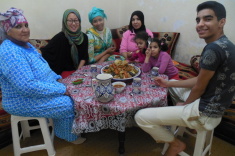A storm was blowing in – fast – and yet here we were on a crooked handmade wooden pirogue, trying frantically to carve a straight path through the water. The pirogue was big, heavy, and almost impossible to steer, especially with the waves growing larger and more powerful by the minute.
We were on Tanzania’s Lake Nyasa – more commonly known as Lake Malawi – on a brief detour before our be-line for the border. As the third largest lake in all of Africa and one alleged so beautiful it shouldn’t be missed – turquoise waters! kaleidoscope of fish! dramatic coastline! – I was too eager to see it to wait for Malawi.
In my desire to immerse myself in all things Lake Nyasa, I had convinced Bruno to rent a local fisherman’s boat for the day. I had had the bright idea that we could ride that boat out to the rocky hills over yonder and do some snorkeling.
“Stop paddling!” shouted Bruno over the crashing of the waves. “You’re just making it harder for me to steer!”
I was sort of relieved to stop rowing. The boat had no seats and my crouching kneed position had long stopped being comfortable. I turned around and sat on the rounded front end of the pirogue, facing a now-sweating – and none too amused – Bruno.
.jpg) |
| Me trying to look cool and collected in the front of our handmade, seat-less, wooden pirogue. Note the curve toward the right. |
I tried snapping a few photos, but the waves and the not-so-far-off grayish blue clouds made it impossible to relax and enjoy my own personal gondola ride. And the hills I’d impulsively pointed to from shore seemed a lot further now.
“I think we’re better off on land,” I muttered to myself.
This was most certainly true. We’d been in Matema, camping right along the lakeshore, for three glorious days already. We’d seemed to have achieved the perfect balance of cultural exploration and relaxation. We swam in water warm enough that we could slip in easily, yet still cool enough to refresh us in the afternoons. We read books in clean off-white sand, enjoying the light breeze from the water. We watched mesmerizing rainbows add their colors to the purplish-blue post-storm sky and the faint yellow illumination of the setting sun on the hills. And we walked up and down the beach and into the surrounding markets.
.jpg) |
| The beach in front of Matema Resort, as the setting sun battles with an impending storm. The beautiful rainbow begins to peep out from the Livingstone Mountains. |
In truth, it was the walks that proved most interesting, for we were able to see the intimate relationship the locals have with their lake. The beach is, in fact, their kitchen, bathroom, and laundry room. I watched women washing last night’s pots and pans in the fresh water and drying chalky-white cassava on blankets in the sun. I saw children bathing naked, boys brushing their teeth, and men soaping up their heads and chests at the edge of the lake. And I saw adults washing clothes in sudsy buckets and then laying them flat out to dry on the rocky sand.
.jpg) |
| There is a lot of action on Lake Nyasa’s beach. Children playing in the water, women washing clothes, fishermen setting out for their day’s work. |
 |
| A woman washing clothes on the lakeshore. Behind, a topless woman and her naked child go for a mid-morning bath. |
Fishing boats, akin to the one in which we were now rowing precariously, lined the beach. Hand-carved out of giant tree trunks, they showed their age by the number of quilt-like patches of metal sheeting atop their wooden frames. Next to the pirogues were salmon-colored heaps of fishing net with floatable plastic water bottles or pieces of flip flops attached. Sometimes a quiet, respectful fisherman sat repairing his net. Next to him, his wife placed his day’s catch on a carefully laid-out tarp, the tiny fish sparkling as they dried in the sun.
 |
| A very smiley fisherman catches us photographing him. The bottles in the left corner will be used to keep his fishing net afloat. Behind is his pirogue, sporting many metal sheeting repairs. |
 |
| Almost the only fish left in Lake Nyasa, they are as small as your middle finger. |
As Bruno tried to maneuver our boat to the distant hills, I caught sight of the village’s beachside market. From the water, we couldn’t hear the music blasting from busted loudspeakers, but we had certainly heard the market before we’d seen it on our walk. We’d also smelled its rotting sewage and toilet before ever laying eyes on the market’s goods. As I walked, I’d pondered why a market would smell that way, until a young boy dropped his pants and defecated right on the beach in front of me.
On one end of the market, people huddled around morning fires cooking plantains and porridge while chickens and pigs scurried around digging through scraps. Further down, women sold grey clay pots decorated with rusty red paint. A few of the pots were makeshift stoves – you place charcoal in an opening in the side and your pan on top, and the heat flows through tiny holes in the clay pot. Most of the pots, however, were simple disk-shaped vessels of all sizes.
 |
| The bustling lakeside pottery market. |
From our crooked swaying pirogue, I attempted to take a photo of the market. I wasn’t afraid of snapping shots from such a safe distance, but during our walk I’d been too intimidated to photograph. Bruno, however, invented an ingenious method of photography whereby he would hold the camera out at his waist and look down at it as though he were fiddling with the settings, and then snap! It’s thanks to him that there are photos on this blog entry.
“The hills are really far,” I called to Bruno from the front end of our pirogue. His face was glimmering and red, and he seemed to be silently begging me to let him off the hook. “Let’s turn around. We’ll never make it to the hills, let alone back again.” Relieved, Bruno turned the boat around easily, for its natural inclination was to veer right in endless circles.
 |
| Bruno’s knees and butt were killing him, so as he turned our boat around, he opted for the standing position. |
Our boat was now pointed toward Crocodile River, where we had walked the previous morning. In the opposite direction of Matema Village, this walk has less cultural stimulation, but more natural beauty. Weaver birds flutter around their round nests dangling in clusters from the treetops. Black and white kingfishers perch on sea grass, scanning the water for their next meal. And crocs supposedly creep along the marshy river, occasionally sneaking into the lake to cause crocodile-havoc.
Because this side of the lake is less inhabited, it was the perfect spot for a group of men to lure a poor cow, slaughter her at the water’s edge, and begin portioning her up for friends and neighbors. Sure enough, individuals began arriving with empty sheets of banana leaf and leaving with big bloody pieces of beef enveloped less than inconspicuously in their banana wrapping. My vegetarian brain couldn’t handle this and the natural peace of this side of the river was shot for me. We walked quickly back home.
 |
| A women laying out cassava root to dry. She will then pound it into a flour-like powder making a cassava ugali, the cheapest of the starch staples. This stuff smells strongly when you walk past. |
 |
| Clothing drying in the sand. All women wear these rectangular fabrics around their waists and shoulders. |
And now, we were paddling quickly back home, to our safe piece of dry sand, where the threat of crooked pirogues and rocky seas would be but a comical memory.
When we reached shore, we were greeted by two laughing locals come to retrieve our faulty boat. “You did well!” they encouraged, even though we’d returned several hours earlier than planned, grimaces smeared across our faces. Either they were mocking us or they were genuinely impressed that Bruno hadn’t tipped us over.
To nurse our bruised egos, we headed straight for the market. Tanzania may not yet have taught us how to navigate crooked wooden pirogues, but she had taught us how to get an awfully good deal on foodstuffs.
Later, we watched the storm break while eating our cheapest lunch yet from the dry safety of our camper van. It was the perfect last meal in Tanzania.
 |
| Doing what I do best – buying produce for cheap. I didn’t buy any pots – they would break too quickly with our frequent off-road driving! |
 |
| Maybe my best deal yet – all this for just over $2USD. |
A big shout-out to my mom on her birthday! Love you!
Don’t forget to read my other stories about Tanzania!


